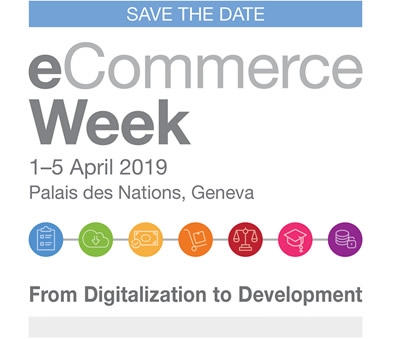WTO e-commerce negotiations: The consumer trust challenge
1 Apr 2019 15:00h - 16:30h
Event report
[Read more session reports and live updates from the UNCTAD E-commerce Week]
The session, organised by Consumer International, was introduced and moderated by Ms Helena Leurent (Director, General Consumers International (CI)). It addressed the need to include key consumer issues when negotiating international deals. The session briefly introduced a provisional consumer checklist that includes elements such as, but not limited to, informed consent, access, and inclusions; and tried to build on that while discussing how the inclusion of consumer issues should be tackled in international negotiations in support to e-commerce and in assurance of consumer protection.
Mr Victor Do Prado (Director, Council and TNC Division, WTO) explained the rationale behind the discussions of e-commerce in the World Trade Organization (WTO), arguing that e-commerce represents a new phenomenon that needs to be understood better and eventually regulated. He further argued that the WTO does not represent a platform for fostering free trade, but rather fluid trade. The regulation of e-commerce has created two main reactions. On the one hand, some states favour of regulation on issues like consumer protection (supported by New Zealand, the European Union, Singapore, Russia and Brazil), privacy concerns, spam, and international co-ordination and co-operation on consumer interests; on the other hand, other state perspectives stress that it is too early to regulate the subject. With regard to data protection and regulation, he pointed out that at the moment there are four types of data flow regulation. A first example is represented by the US approach to check data ex post. A second example refers to the European Union’s framework of ex ante checking of data. A third example can be contextualised by China’s attitude to have a constant control on data; while a last typology represents the complete lack of regulation and checking mechanisms. Addressing a question posed by the audience, he acknowledged the question of the discrepancy between the willingness to talk about free flow of data while global data protection is still missing. He argued that self-regulation, especially by private entities, has not proven to be effective.
Ms Léa Auffret (Senior Trade Policy Officer & Trade Team Leader, BEUC) gave an overview of the European Union’s consumer perspective. She argued that there is a need to include the consumer perspective in the policy-making development of the WTO. Arguing that consumer protection does not represent a barrier to trade, she stressed that a necessary step to be taken is the establishment of a political will at the national and international level that would foster the implementation of consumer protection. In addition to that, she acknowledged that issues such as net neutrality, cross-border data flows, or privacy are important as interconnected to the topics discussed at the WTO, but do not have to be discussed within the WTO structures. As a result, she recognised the Human Rights Council as a better forum for discussion on data protection and privacy than the WTO.
Additional remarks were made by Mr Nick Ashton-Hart (Geneva Representative, Digital Trade Network) and Mr Alexander Mora (Chairman, LATAM EVICERTIA). Ashton-Hart challenged the general idea of conflicting arguments for more regulatory frameworks and underlined the openness feature of e-commerce negotiations that allow the participation of non-members. Mora focused instead on the notion of trust as the most valuable element. He reaffirmed the need to have consumer protection and consumer interests as part of the discussion, as well as the necessity to harmonize the competition regimes to provide consumers with benefits from the liberalisation of trade. He argued that new instruments, models of negotiation, and agreements need to be put in place.
By Stefania Grottola
Related event

eCommerce Week 2019: From Digitalization to Development
1 Apr 2019 15:45h - 5 Apr 2019 15:45h
Geneva, Switzerland
